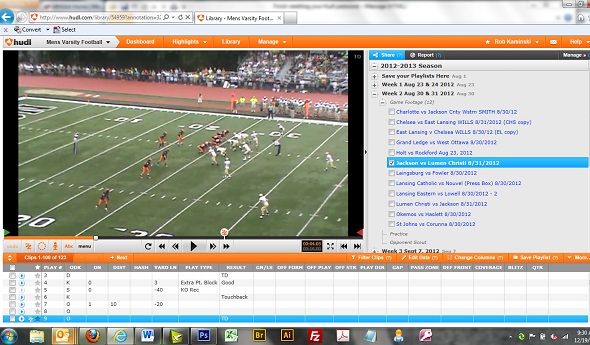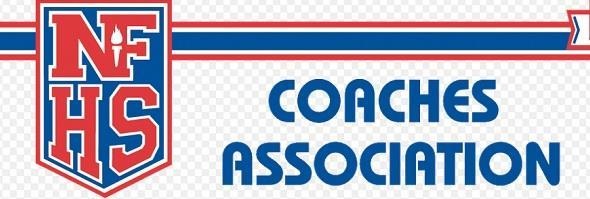
The Changing Face(book?) of Coaching
March 26, 2013
By Rob Kaminski
MHSAA benchmarks editor
From online video exchange programs such as hudl.com to social media platforms like Facebook, Twitter, and LinkedIn, the face of coaching and communicating with teams is ever-changing. How much is too much, and how are the new tools being used by the old guard?
With increasing frequency, today’s coaches are turning to technology to assist in their endeavors, particularly in video review and data compilation, as the number of programs available to them seems to grow on a daily basis.
Among the recent leaders, hudl.com seems to have won the favor of football coaches across the state, reducing video exchange and study to a couple clicks of the mouse.
Several members of the MHSAA Student Advisory Council report that their football coaches use the web-based program, and even local officials associations are using it for film study.
Similar programs are making it easier for today’s coaches to analyze data and compile statistics as well.
“The dispensing of information is much quicker than it used to be,” said Marshall bowling coach Sue Hutchings. “We use a scoring software for our stats.”
In more “visual” sports such as competitive cheer, online video is now essential.
“Video playback and feedback to athletes has helped the sport 10-fold,” said Middleville Thornapple-Kellogg coach Abby Kanitz.
In some cases, coaches are taking the lead on such initiatives.
“I run the MISCA (Michigan Interscholastic Swim Coaches Association) website and receive plenty of positive feedback about us posting meet results and top times reports,” said Bloomfield Hills Andover coach David Zulkiewski. “I also visit MHSAA.com weekly. Since I run the MISCA website, I want to make sure I have accurate and up-to-date information posted.”
Technology has also made the world a bit “greener” even in the small corner that is interscholastic athletics. From the required MHSAA rules meetings moving to an online format, to volumes of data now stored on flash drives rather than in file cabinets, coaches are realizing savings in both time and cost.
“The current state of track and field and cross country is so much more manageable than when I began,” said East Kentwood’s Dave Emeott. “I remember compiling actual papers from all over the state to keep track of the opposition, and now thanks to Athletic.net we have this access at the tip of our fingers. These programs have also replaced nights spent inputting data and record-keeping. I am sure I have replaced all that time elsewhere, but it is probably spent with kids and not with data.”
With the saturation and availability of these reports around the clock also comes temptation for those who are driven, and even obsessed, with such numbers. Coaches can rank near the top of that list.
“Technology can be extremely helpful and time-saving for coaches and teachers,” said Grand Haven wrestling coach James Richardson. “But, the disadvantage is the coaches and athletes have a more difficult time getting away from the sport, as we have access to so much information, and others have more access to us. This can lead to too much time being devoted to our sport.”
It also might even take some of the fun out of the actual competition.
“I think the one negative side of technology is the lack of the unknown,” Emeott said. “There was a day when we would enter a meet and not really know how the day would turn out. Now I have most meets scored within 10 points the day before we arrive.”
At times, such advance information also can lead to overconfidence heading into competition.
“Currently the MHSAA Final draw is posted online, and my players often see it and draw their own conclusions before I have a chance to talk to them about it,” said Allegan tennis coach Gary Ellis. “In the past, I was able to present their draw in the light in which I wanted them to see it.”
Another side effect is the indirect push to play beyond high school.
“There is a lot more social promotion and glamourizing of the athletes,” said Mike Van Antwerp, Holt lacrosse coach. “The recruiting pressure has increased tremendously, which is causing kids to commit earlier and go to great lengths to have a chance at being recruited.”
The world has indeed become a smaller, more familiar place. Not only can students and coaches learn pertinent statistics relating to any given opponent, they can also learn personal information about their competition through the deluge of social media vehicles.
It is in this realm where the greatest divide exists between coaches and their athletes when the subject of technology comes up.
Several members of the MHSAA Student Advisory Council indicate that their coaches do not use social media to assist with the daily activities involved with their sport, while others are but only on a limited basis.
It’s not that the coaches don’t know about Facebook, Twitter, LinkedIn, or the other platforms. More likely, they are all too well versed in the abuses of such mediums by young adults not yet ready to understand the lasting ramifications of a random tweet or damaging photo.
“We have specific rules for use of cell phones at practice, games, in the locker room, etc.,” said Diane Laffey, athletic director and coach at Warren Regina. “We also have a form for parents to sign if they want the coach to be able to text their daughter about practice or game cancellations or changes. We stress that the texting only be for necessary things, and the parents are to give permission.”
Safeguarding against the misuse of handheld devices is becoming as commonplace as handing out uniforms prior to the season.
“By rule, our players aren’t allowed to bring electronic devices to the court with them. We restrict cell phone usage at practice,” said Portage Central tennis coach Peter Militzer. “Players must ‘friend’ the coach on either Facebook or Twitter, and I monitor their activities to make sure their language and behavior meets our standards. We restricted a player’s opportunity to play on varsity last season due to excessive use of crude language and an offensive user name on Twitter.”
PHOTO: This is a screenshot from Hudl.com, an online service used by high school football coaches for video analysis and archiving.

3 Michigan Coaches Earn NFHS Honor
By
Geoff Kimmerly
MHSAA.com senior editor
January 16, 2019
Three Michigan high school coaches with long histories of championship success were honored Wednesday with 2018 National Coaches of the Year awards presented by the National Federation of State High School Associations (NHFS) Coaches Association.
Midland Dow boys tennis coach Terry Schwartzkopf, Pontiac Notre Dame Prep girls volleyball coach Betty Wroubel and Bloomfield Hills Marian and Birmingham Brother Rice golf coach Leon Braisted III – formerly the longtime coach of the girls and boys programs at Birmingham Seaholm – earned three of the 22 available NFHS awards and have led their programs to a combined 13 MHSAA Finals championships.
The following brief bios include excerpts from each honoree’s coaching philosophy, which they were asked to submit after being identified as candidates for the awards.

“An athletic program opens the door for students to become involved in different sports. Any sport the student joins is quite a learning experience. A coach through practices teaches the players to be ‘team players and learn the rules of the sport.’ During the practices and playing the sport, players learn tolerance, become alert to their surroundings, and most importantly (the sport) offers exercise. As a golf coach for 21 years I recognize that golf is a lifelong sport. The player learns patience, perseverance and (the sport) motivates the individual to desire to improve (his or her) game. At the beginning of each new season, I encourage the students to join in participating on a golf team. I do not turn any students away from being on the team whether they know how to play golf or not. There is much one can learn from being a teammate and facing the challenge of self- improvement, along with meeting new friends. Joining a sports team is more than just excelling on the field. It is the ability to meet others, a place and time where a person can enjoy the moments away from the rapid pace of daily life.”

“I believe that the sport is irrelevant when it comes to coaching. Granted, specific content knowledge is imperative to success, but coaching is about creating a stable environment in which young individuals can mature as individuals and athletes. I believe that athletics help individuals learn how to cope with loss, cope with success, and how to work to achieve a goal. It allows them the ability to feel that they contribute to something greater than themselves, to put team before self, and serves as something that unites players regardless of age or circumstances. Due to this mindset, our teams tend to be a tight-knit bond of individuals who help each other to succeed. In fact, this year alone I have had seven alumni return at various times in order to work with the team, desiring to give back to the program. In fact, my original captain returned to serve as a volunteer assistant coach this year. These legends give faces to the names that my players have heard stories of as they continue to unite this team past, present, and future. … The records, trophies, and competition are a wonderful part of the game of tennis, but the real victories come in watching these young boys turn into productive men willing to serve others, live with integrity, and exhibit character and sportsmanship both on and off the court.”

“My philosophy of athletics has changed considerably since I started coaching and has continued to change throughout my career. I believe that athletics provide a powerful vehicle to teach and prepare our student athletes not only in sport, but more importantly in life. My responsibility has never been solely to teach my players to play and love the sport of volleyball, but rather to pursue their passion for something they love and how to grow as young, strong females today – to prepare them to handle disappointment, failure, adversity and stress in a healthy manner and success with a humble heart. As important as it is to help the players develop their game skills, it is far more important to help them in their personal growth journey, to prepare them for a world that will be very different than the one I grew up in, and to create a team-oriented culture in a world that is all about ‘me.’ … I try to teach and empower my players to believe in themselves, embrace all opportunities of both success and failure, and how to achieve what they once considered unimaginable; to work hard, be humble, grateful, forgive oneself, forgive others, and always strive to be what God created them to be.”
Three more Michigan coaches earned honors in Section 4, which includes Michigan, Illinois, Indiana, Iowa and Wisconsin. Hartland wrestling coach Todd Cheney led the Eagles to the Division 1 title in 2016 – the school’s first in his sport – while Dexter swimming & diving coach Michael McHugh has led his school’s boys program to four MHSAA titles including three straight in Lower Peninsula Division 2. Sterling Heights Stevenson competitive cheer coach Brianna Verdoodt led her program to its first MHSAA title, also in Division 1, in 2018 after Stevenson finished Finals runner-up in 2017.
The NFHS has been recognizing coaches through an awards program since 1982. Winners of NFHS awards must be active coaches during the year for which they receive their award.

